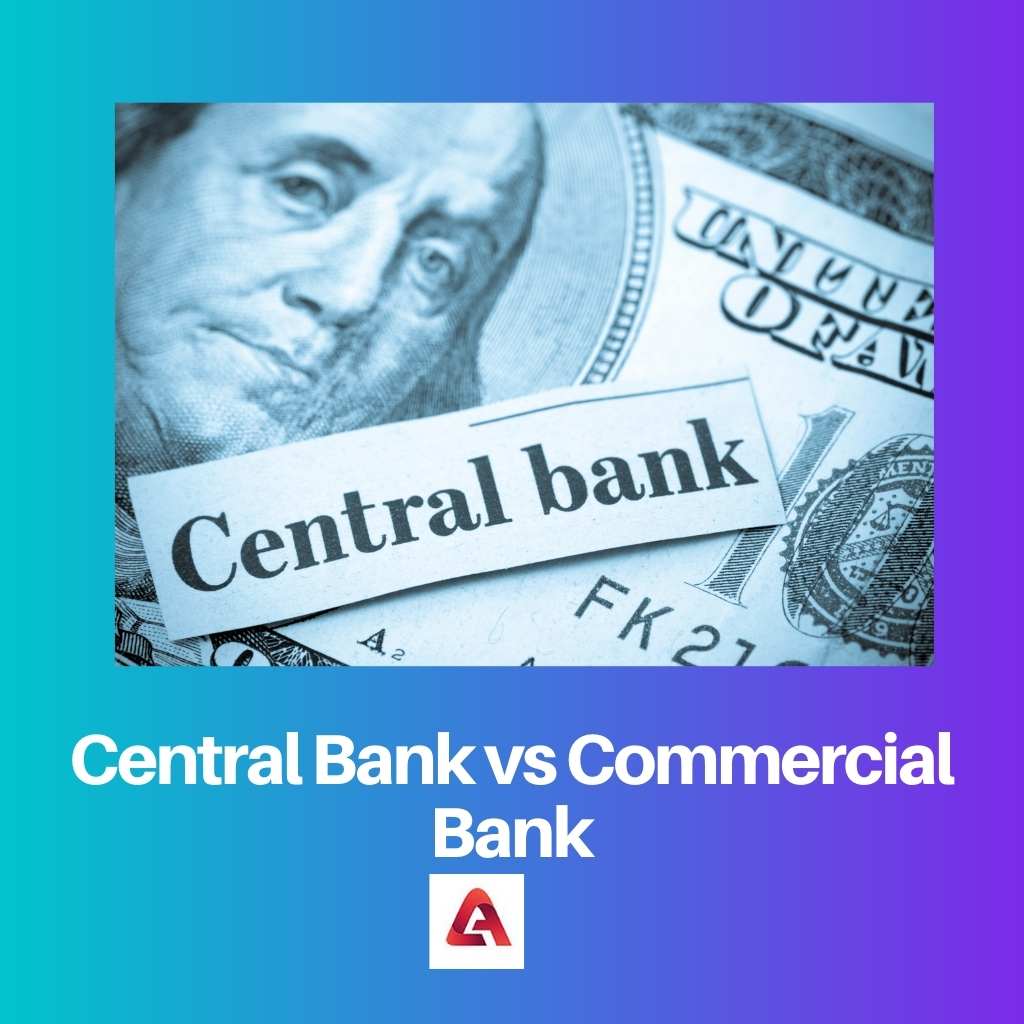Banks play a vital role in the economy of each nation. They are very advantageous for people who want to start a business. Rather than lending money to some people, it is the best choice to look for a bank.
Central and commercial banks are two types of banks available in every country.
Key Takeaways
- Central banks are government institutions responsible for managing a country’s currency, monetary policy, and financial stability, while commercial banks are privately owned entities that provide financial services to the public.
- Central banks regulate and oversee commercial banks, ensuring they adhere to financial regulations and maintain the financial system’s stability.
- Commercial banks offer various services, such as accepting deposits, providing loans, and facilitating transactions for individuals and businesses.
Central Bank vs Commercial Bank
The difference between the central bank and commercial bank is that the central banks are publicly owned and can not be more than one in a single country. On the other hand, the ownership of a commercial bank can be both private and public, and there can be more than one commercial bank in the same country.

The Central Bank is an institution that looks after the monetary policies and systems of the country. The Central Bank, a monetary authority, is also known as a reserve bank.
The concept of the central bank was introduced in the seventeenth century. The Swedish Riksbank became the first central bank that was established in 1668. The type of this bank was a joint-stock bank.
A commercial bank is associated with companies and citizens of a nation. It is a financial institution that requires deposits from people and provides loans for organizations and people.
Commercial Bank also provides checking account services. The primary services offered by a commerce bank are saving accounts and certificates of deposit to the people and small businesses.
Comparison Table
| Parameters Of Comparison | Central Bank | Commercial Bank |
|---|---|---|
| Meaning | The Central Bank is a national financial institution that oversees money regulation and economic policies. | Commercial Bank is a public entity that makes connections between government and bank and provides services to the public. |
| Role | Central banks are responsible for creating policies and deciding the interest rates for money borrowed by people. | Commercial banks do not make such policies but only follow them to provide services to people. |
| Source of | The Central Bank is the primary source of the nation to supply money to government institutions and other authorities. | Commercial banks are a source of lending money. They don’t involve in supplying money like the central bank. |
| Ownership | Central Banks are owned by the nation’s government or the ministry of finance. They can’t be private property. | Commercial banks can work under the supervision of the government, and they can be privately owned. |
| Number | In every country, there is always a single central bank, not more than that. | Since commercial banks can be owned privately, there is no limit on their number. |
What is Central Bank?
A central bank or reserve bank is a national bank that offers monetary and banking services for its country’s government. It helps the government to implement its economic policies.
Moreover, It is an institution that manages the currency. It also acts as a supervisory body for the member banks to check their working and prevent any type of fraudulent activity by these banks.
This bank is not directly connected to people. The Central banks have no political control over them, but there is limited control through executive and legislative bodies.
As mentioned earlier, the Central bank controls the supply of money by raising or lowering the rate of interest. Simply put, the supply of money from commercial banks to people or from people to commercial banks is entirely controlled by the Central bank.
For instance, when the credit demand is higher in commercial banks, the central bank can increase the rate of interest, thus resulting in a decrease in the market.
In contrast, if the demand for credit decreases, the Central bank may lower the interest rate, resulting in a higher order for credit.
The specific objectives of the Central bank include promoting growth and employment, ensuring financial stability, controlling inflation, etc.
In addition to these objectives, it also provides credit to the government in case of a deficit budget. This is called deficit financing.

What is Commercial Bank?
A financial institution that accepts deposits provides loans, offers to check account services, and certificates of deposits is referred to as a commercial bank.
The funds of commercial banks come from the money deposited by the people, interest revenues on loans provided to people, and money market accounts. These banks also get funds from the country’s Central bank or reserve bank.
But in contrast to the central bank, commercial banks are in direct contact with their clients. Commercial banks are primarily concerned with providing financial facilities.
People earn interest on their deposits in the bank. They provide loans to small businesses or any other consumers. However, the rate of interest imposed on the deposits is less than the interest levied on the loans.
For instance, the rate of interest offered by the banks on the stakes may be 0.35% annually, but they may charge 5% annually or higher on the loans.
These banks also charge money for insufficient funds, maintenance charges, safety deposit boxes, and minimum balance fees.
Commercial banks also provide facilities like automated teller machines to withdraw cash from their deposits anytime and anywhere, without going to that particular bank.
Recently, with the advances in internet technology, bank customers are able to do activities like transactions of money and bill payments online.
Commercial banks play a vital role in a country’s economy as they create capital, regulate inflation, and ensure liquidity and thus lead in boosting its growth.

Main Differences Between Central Bank and Commercial Bank
- Central banks are entities that belong to the nation, and they do not seek profit. On the other hand, commercial banks work for a profit.
- Central banks are one of the highest authorities in finance, and commercial banks and government are its clients, whereas people and companies are the clients of a commercial bank.
- The availability of the credit is monitored by the central bank. On the other hand, these credits are created by the commercial bank.
- RBI, The Reserve Bank of India, is an example of a central bank. On the other hand, examples of commercial banks are HDFC Bank, ICICI Bank, Axis Bank, etc.
- A nation can have only one central bank because it is directly associated with the government, whereas a country can have as many commercial banks as possible.
- https://books.google.com/books?hl=en&lr=&id=A8EWDAAAQBAJ&oi=fnd&pg=PP1&dq=Central+Bank&ots=r4wLS8VA1i&sig=5vvoasYJOOjGqserDD-xwy560YU
- https://www.researchgate.net/profile/Leonard-Nakamura/publication/4862945_Commercial_bank_information_Implications_for_the_structure_of_banking/links/558dab8708ae15962d89470a/Commercial-bank-information-Implications-for-the-structure-of-banking.pdf
